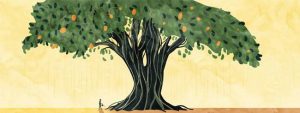
Art by Sefira Lightstone
A WEEKLY TORAH THOUGHT FROM RABBI MORDY
This week’s Parsha (Vayigash) concludes the story of Jacob’s sons. Joseph is formally reunited with his brothers as he reveals his true identity to them. They embrace and finally reconnect; Jacob is then given the news that Joseph lives as viceroy of Egypt and that he should come down to dwell there together with his family. He does this and all is finally well with the House of Jacob. In breaking the news to his father and, simultaneously proving that he is, in fact, Joseph, he sends a caravan of wagons laden with goodies. Why wagons? Because the Hebrew word for the word wagons, “Agalot,” is similar to the last law that Joseph and Jacob studied together prior to his saga, the laws of “Eglah Arufa.” These are laws associated with someone who is found dead in an ownerless field. In such an unfortunate circumstance, Jewish law dictates that the elders of the closest towns should measure the distance from those towns and whichever is found to be closest must bring a sacrifice – the Eglah Arufa – thereby absolving them from wrongdoing. Since they are closest, they bear, however indirectly, some responsibility. They could have done something, even if he were merely a traveler and not a resident, to prevent this tragedy from occurring. Sorry for the study session, but, more importantly, why the cute allusion by Joseph? Why not just give some password to his dad to prove he is his son?
In doing so, Joseph is telling his father something deeper in an attempt to console him. He is showing his father that this law, which, in fact, speaks to the responsibility that any elders, leaders, parents may have, actually helped Joseph through his darkest days. Joseph survived largely because he knew that his father had never given up hope on him. We as a community need to realize the tremendous obligation that we have to impact those around us. Maybe in passing, but especially if we have relationships, we need to see ourselves as leaders, elders, brothers, sisters and parents—people who can make a world of difference in someone’s fragile life. No one need point fingers or place blame, but we need to search inside ourselves and ensure that we are doing more people in need. In different ways and at different times, we have all been that person. If we have what to give, whether spiritual or material, now is the time to see who needs it! Good Shabbos!





